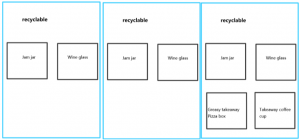To: Dr. Erika Paterson, ENGL 301 99A Instructor
From: Shuge Luo, ENGL 301 99A Student
Date: October 14th, 2020
Subject: proposal for targeting waste management at Circular Economy Accelerator Programme project for Zero Waste Scotland
Introduction
Zero Waste Scotland is a not-for-profit environmental organization, funded by the Scottish Government and European Regional Development Fund. The organization focuses on various subjects and fields including food waste reduction, sustainable custom behavior, etc. However, the ultimate goal of Zero Waste Scotland is to provide practical support to encourage the growth of the circular economy in Scotland. There are a few branch programs focus on different areas of work: The Circular Economy Accelerator Programme aims to increase the resource efficiency of Scotland, further support community-based organizations to build on existing local resources. Business support Service and Investment fund are targets to support those who are looking to develop circular business models.
Statement of Problem
Waste has a significant negative impact on the environment, climate, and human health. Although waste management in Scotland has improved considerably in recent decades, over a quarter of municipal waste is still end up on landfill and less than half of them is recycled or composted.
In the Accelerator Programme, Zero Waste Scotland attempt to increase resource efficiency and come up with ways to deal with recycling performance. However, waste management is a bigger story involved in user, customer, stakeholder, server, and government. With China refusing to be the world dumping ground, North America and Western Europe are push step on the stage where they examine their waste management technic and take efforts to improve the local waste management system.
The problem is that the waste management system doesn’t always work out in the way that we expect. Some research has shown that due to principles of supply and demand, primary goods (goods produced with raw materials) are unlikely to be displaced by recycled goods (goods produced with the recycled materials). Majority of recyclable garbage ended up on the landfill due to the lack of accessible market for recycled goods. However, as for customers, recycling is marked as doing good for the environment though it leads to an increase in consumption at the end of the day. In other words, we are adding materials to the environment with recycling.
Proposed Solution
To tackle this problem, first, Zero Waste Scotland could do is educate the public to identify the misconception about recycling. Secondly, instead of advocating recycling, highlight the importance of reuse.
Since Scotland’s government has ambitious targets for reducing waste by 2025, the Scottish Government will introduce regulations to drive separate collection and treatment of a range of resources in order to maximize their reuse value. Zero Waste Scotland could bring updated information into the campus in the form of various activities that encourage students to learn more about the current policies on reuse and give them an opportunity to come up with ideas that could eventually land on the desk of the officer. At the University of Edinburgh, the Department for Social Responsibility and Sustainability works to enable the University to understand, explain, and deliver social responsibility. It is a good chance to introduce them to some local environmental-friendly organizations like “The Tool Library” help in promoting sharing tools as a way of reducing environmental impacts.
Scope
To determine if the misconception is prevalent among social members and the effectiveness of my proposed solution, there are few questions needed to be included:
• What is the cost of using recycled materials for a business entity?
• Does Zero Waste Scotland have a relative concern on this issue?
• Consumption is not always considered negative, but how to balance the increasing consumption with the idea of Zero Waste.
• Who should be the leader of this project to have such a huge impact?
Methods
Surveys are the primary source of data. Though the survey targets would cover all range of age of the population in the reachable area, students will be our primary target because they are viewed as the most educated group with an open mind.

Quizzes on if this item is recyclable
Another method involves testing random people’s knowledge with interesting facts quizzes(shown above).
Qualifications
The experience and networks gained from living in Edinburgh give me a chance to interact with local people and organizations. I volunteered with the project associate with Zero Waste Scotland which could offer the data needed for addressing this problem.
Intended Audience
The potential audiences are Zero Scotland officers and the project leader of the ‘Accelerator Program’.
Conclusion
Exposing what is the actual waste management system to the audience plays an important role in the process of delivering a circular economy Accelerator project for Zero Waste Scotland. It could open a door for a broad market on recycled goods which are originally disliked by customers.
Leave a Reply